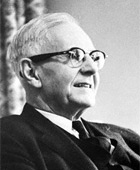John Crowe Ransom was born 30 April 1888 in Pulaski, Tenn., the third of five children of Methodist minister John James Ransom and his wife Ella Crowe Ransom. John Crowe attended the Bowen preparatory school in Nashville, completing a rigorous program in classical languages, English, history, mathematics, and German. Entering Vanderbilt University at 15, he continued his classical studies. He was a Rhodes Scholar at University College, Oxford, from 1910 to 1912, reading widely in classics and philosophy. In 1914 Ransom accepted an instructorship in English at Vanderbilt, where he immediately began the method of teaching that, through texts written in the late 1930s and early 1940s by his former students Cleanth Brooks and Robert Penn Warren (the "New Critics"), was to dominate the teaching of literature in American colleges and universities for nearly 30 years: close analysis of individual texts with emphasis on the uses of language.
Except for army service during World War I, followed by a term at the University of Grenoble, Ransom remained in the English department at Vanderbilt until 1937 (teaching many summer sessions in other colleges and programs). His first volume of poetry, Poems about God, appeared in 1919.
In the fall of 1919 Ransom began meeting with the group that would, in 1922, begin to publish the Fugitive, a magazine whose name signified flight from "the high-caste Brahmins of the Old South" (according to Ransom's foreword). Ransom, an already-published poet and a respected teacher, was sought out for advice and judgment by such younger members of the group as Donald Davidson and Allen Tate (and later Warren, Andrew Lytle, Jesse Wills, and others). The Fugitive, which lasted 19 issues, from 1922 to 1925, and expired not for lack of funds but for want of an editor, published the bulk of Ransom's mature poetry, collected in the volumes Grace after Meat (1924) and Chills and Fever (1924). In 1927 Two Gentlemen in Bonds was published, containing some of Ransom's best poems: "Dead Boy," "Blue Girls," "Janet Waking," "Vision by Sweetwater," "Antique Harvesters," and "The Equilibrists."
In God without Thunder (1930) Ransom proposed that new rationalistic theologies were destructive of the religious sense, for they destroyed a person's respect for the mysterious universe and elevated "science," which analyzes and uses "nature" rather than fearing and loving it. Ransom's religious ideas were coordinate with his defense of the South in "Reconstructed but Unregenerate," his essay for I'll Take My Stand (1930), and other essays about the South in contemporary society, such as "The South Defends its Heritage" and "The South—Old or New?" For the former Fugitives and others who published I'll Take My Stand, the respect and love for nature associated with farming, especially family subsistence farming, were intimately bound up with the best social values of the culture—filial piety, kindliness, good manners, respect for the past, contemplativeness, and appreciation not only of the natural world but of art.
The publicity focused upon I'll Take My Stand and a series of debates related to it made the agrarian position a focal point for discussion of broad cultural values of American society. In an essay for a 1936 collection, Who Owns America?: A New Declaration of Independence (edited by Herbert Agar and Allen Tate), Ransom retreated from the extreme agrarian position, acknowledging that the South must accept industrialization in order to preserve economic autonomy. By 1940 Ransom had called the agrarian ideal a "fantasy" in the Kenyon Review, thus making public and final his defection from the economic position he had defended a decade before. The espousal of humane values—including respect for the mysteries—was not recanted but became the center of Ransom's poetic theory in The World’s Body (1938), The New Criticism (1941), and later essays.
Ransom accepted a teaching position at Kenyon College in Gambier, Ohio, in 1937 and founded the Kenyon Review two years later. During Ransom's editorship of the Kenyon Review (1939-59), he published important works by such southern writers as Andrew Lytle, Randall Jarrell, Caroline Gordon, and Flannery O'Connor. Although Ransom had left the South and had abandoned the agrarian program, he remained a staunch spokesman for the aesthetic and ethical values formulated in the essays and poems of his Vanderbilt period. He died 2 July 1974 in Gambier, Ohio.
Suzanne Ferguson
Ohio State University
Louis D. Rubin, Jr., in The New Criticism and After, ed. Thomas Daniel Young (1976); John L. Stewart, John Crowe Ransom (1962); Thomas Daniel Young, Gentleman in a Dustcoat: A Biography of John Crowe Ransom (1976).
|






